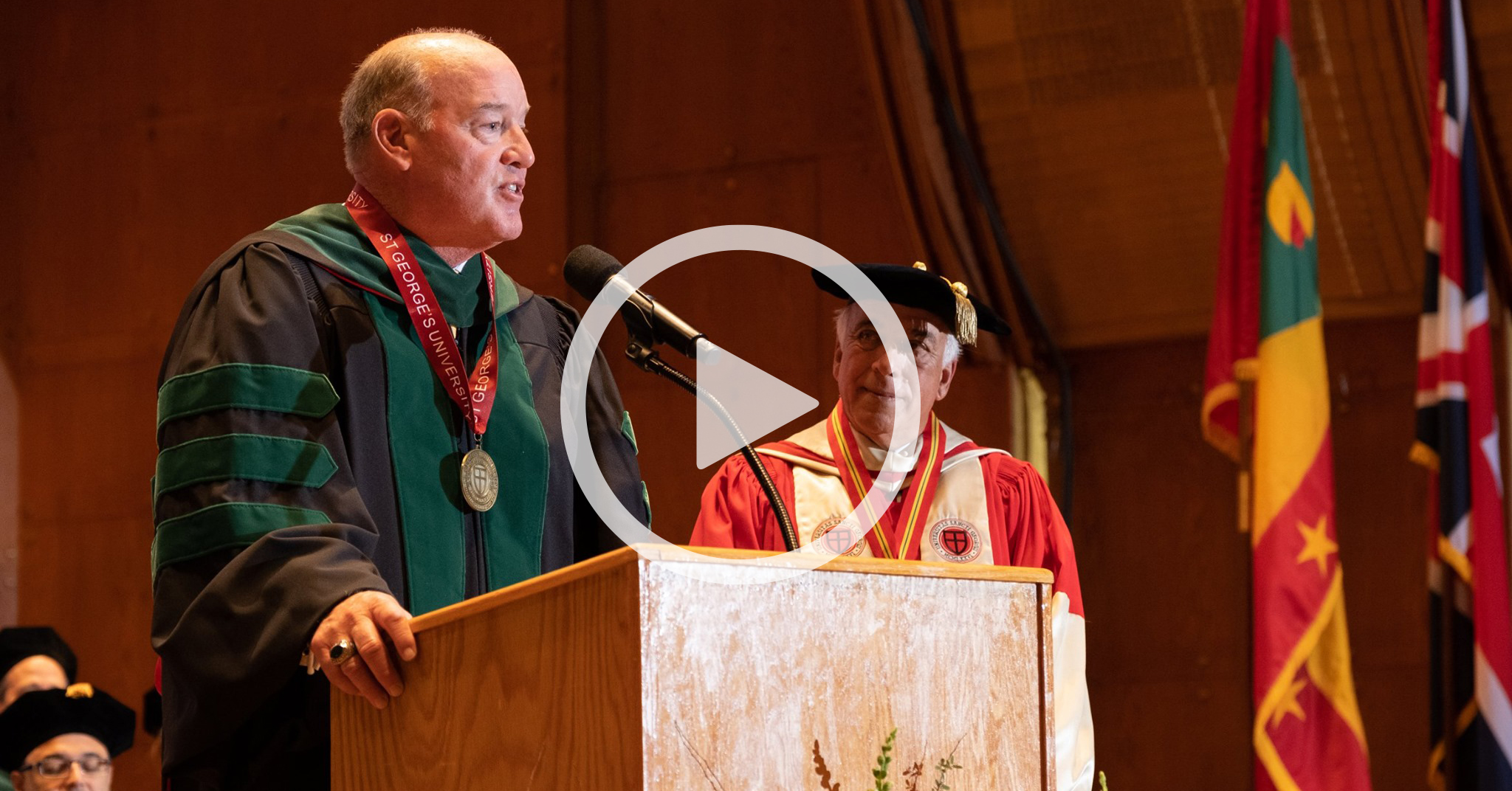Scholars From Botswana, Where 1 in 5 Doctors Graduated From SGU, Begin Medical Studies in Grenada
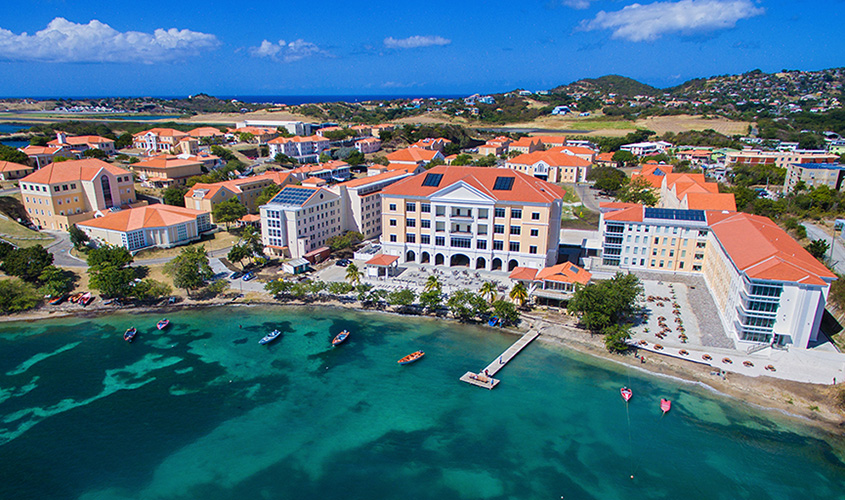
Three students from Botswana have taken their first steps towards a career in medicine at St. George’s University (SGU), the leading international medical school in the Caribbean, after being awarded full-tuition scholarships to study on the four-year MD program.
Wathata Onalethata Ntwayapelo, Lungowe Kabasiya, and Chevula C. Munaani arrived last month, in the latest example of St. George’s long-standing relationship with the Ministry of Health and Education and the Government of Botswana, which offers full-tuition scholarships to qualified students to pursue medical degrees.
Approximately one in every five practicing doctors in Botswana is a graduate of SGU—a remarkable demonstration of SGU’s commitment to training qualified global physicians to work across the world in areas of need. SGU is now the second largest source of doctors for the entire US workforce, and a further one in every five physicians in Trinidad and Tobago are also SGU graduates, underlining the exceptional range of career opportunities for qualified doctors trained in Grenada.
“At St. George’s University, our international student body has always been our greatest asset and building the capacity of young doctors in training to address global health challenges is part of our philosophy as a medical school,” said Dr. G. Richard Olds, president of St. George’s University.
“We recognize that there are two aspects to this: helping ambitious and qualified students who may not otherwise have access to a leading medical education to study with us in Grenada, but also acting as a provider of doctors for those places of need, helping to address shortages in healthcare provision and combating health inequality,” Dr. Olds said. “Few countries exemplify that better than Botswana, and we are tremendously proud of our joint achievements in this area.”
Added Dr. Olds: “We’re pleased to welcome Wathata Onalethata Ntwayapelo, Lungowe Kabasiya, and Chevula C. Munaani to our True Blue campus and look forward to helping guide them on their path to a career in medicine.”
Profound Impact: SGU Educated Second-Most Licensed Physicians in US in 2018

For more than 40 years, St. George’s University has provided highly qualified physicians to the United States, and never before has its impact been more evident. According to a recent report published in the Journal of Medical Regulation, SGU educated the second-most licensed physicians in the United States in 2018.
The research, titled “Federation of State Medical Boards (FSMB) Census of Licensed Physicians in the United States, 2018,” showed that 10,791 US-based doctors had graduated from St. George’s University, the most among international medical schools, including those in the Caribbean. SGU stood behind only Indiana University School of Medicine with 11,828 graduates worldwide.
“St. George’s University physicians are making a positive influence on US healthcare every day and in every corner of the country,” said Dr. G. Richard Olds, president of SGU. “We are proud of the quality of care they provide and look forward to continuing our mission of training doctors of the highest caliber.”
In 2019 alone, SGU graduates secured more than 960 US residencies in 43 states and in specialties ranging from anesthesiology and emergency medicine to pediatrics and surgery. It marks the fifth consecutive year that SGU was the number one provider of new doctors to the US healthcare system.
The FSMB report also revealed that the percentage of practicing doctors who graduated from a Caribbean medical school had grown by 78 percent since 2010. Since opening its doors in 1977, SGU has trained more than 16,000 School of Medicine graduates who have gone on to practice in all 50 United States and more than 50 countries around the world.
“St. George’s University is committed to preparing our students with the foundation of knowledge and clinical skills to prosper in their medical careers,” said Dr. Richard Liebowitz, vice chancellor of SGU. “Our graduates have not only demonstrated their excellence in a hospital setting but also the profound effect that, collectively, they have on medical care in the US and globally.”
-Laurie Chartorynsky
SGU’s DVM Program Gains Full Accreditation From Royal College Of Veterinary Surgeons
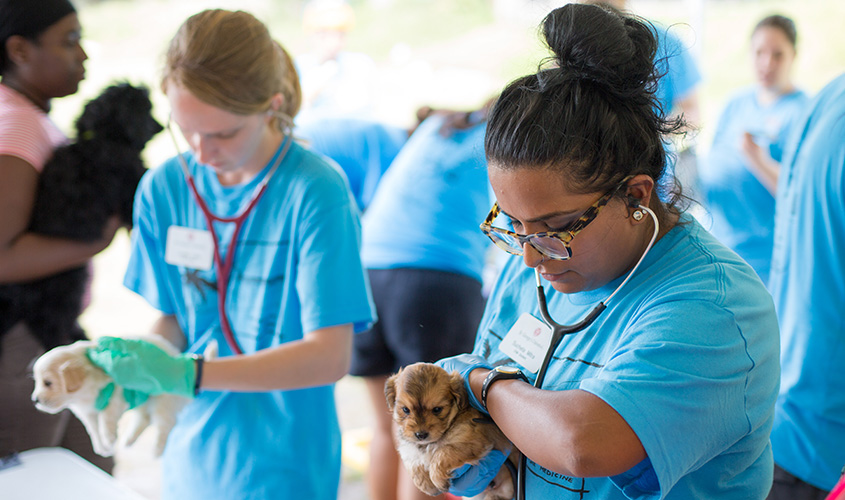
Adding to its growing list of achievements, the St. George’s University’s School of Veterinary Medicine’s Doctor of Veterinary Medicine (DVM) program has received full accreditation from the Royal College of Veterinary Surgeons (RCVS), the organization that sets the standards of veterinary care in the United Kingdom, through 2024.
As a result of the accreditation, SGU’s DVM graduates, who have also completed the Global Veterinary Health Track, will be eligible to register as members of the RCVS and practice in the UK without further examination. The School of Veterinary Medicine is now one of the few schools in the world to be accredited by both the American Veterinary Medical Association Council on Education (AVMA COE) in the United States and Canada, as well as the RCVS in the UK.
“The RCVS accreditation reaffirms SGU’s commitment to offering the highest-quality education and services to aspiring veterinary students,” said Dr. Neil Olson, dean of SGU’s School of Veterinary Medicine. “Our dual accreditation is a major feather in our cap for the future recruitment of the best and brightest students and faculty to our program from around the world.”
The RCVS is the veterinary regulatory body responsible for monitoring the educational, ethical, and clinical standards of practicing veterinarians in the UK and the Commonwealth of Nations. It evaluated the Doctor of Veterinary Medicine program on the following 12 accreditation standards:
- Organization
- Finances
- Facilities and equipment
- Animal resources
- Information resources
- Student caliber
- Admission and progression criteria
- Academic and support staff qualifications
- Curriculum
- Assessment policies, methods, standards, and quality assurance
- Research programs, continuing and higher degree education, and
- Outcomes assessment procedures
Dean Olson was notified of the RCVS accreditation in a September 13 letter and notified students of the achievement that afternoon. The RCVS had first visited SGU in 2017 and offered suggestions and recommendations. It was satisfied that improvements had been made during a recent follow-up visit to the school.
The accreditation builds on the School of Veterinary Medicine’s growing accolades. Last November, the AVMA renewed the SVM’s accreditation through 2025—the maximum seven-year term for accreditation. SGU’s SVM is one of 19 AVMA-accredited schools outside the US, and one of just two in the Caribbean. In addition, SGU’s Small Animal Clinic (SAC) was recently re-accredited by the American Animal Hospital Association (AAHA) through 2022, having earned the full three-year term for re-accreditation.
Now in its 20th year, the School of Veterinary Medicine has graduated nearly 1,700 students who have gone on to practice in 49 states in the United States and 16 other countries around the world. The School maintains partnerships with 31 universities and clinical facilities in the US, UK, Canada, Ireland, and Australia, where fourth-year students spend a year of clinical training at an affiliated veterinary school.
“To be fully accredited by the RCVS puts us right at the top in terms of the quality of training that we provide to our students looking to pursue a career in animal health care,” said Dr. Olson. “As we continue to expand and grow our successful veterinary program at SGU, we will look for further partnerships around the world.”
– Laurie Chartorynsky
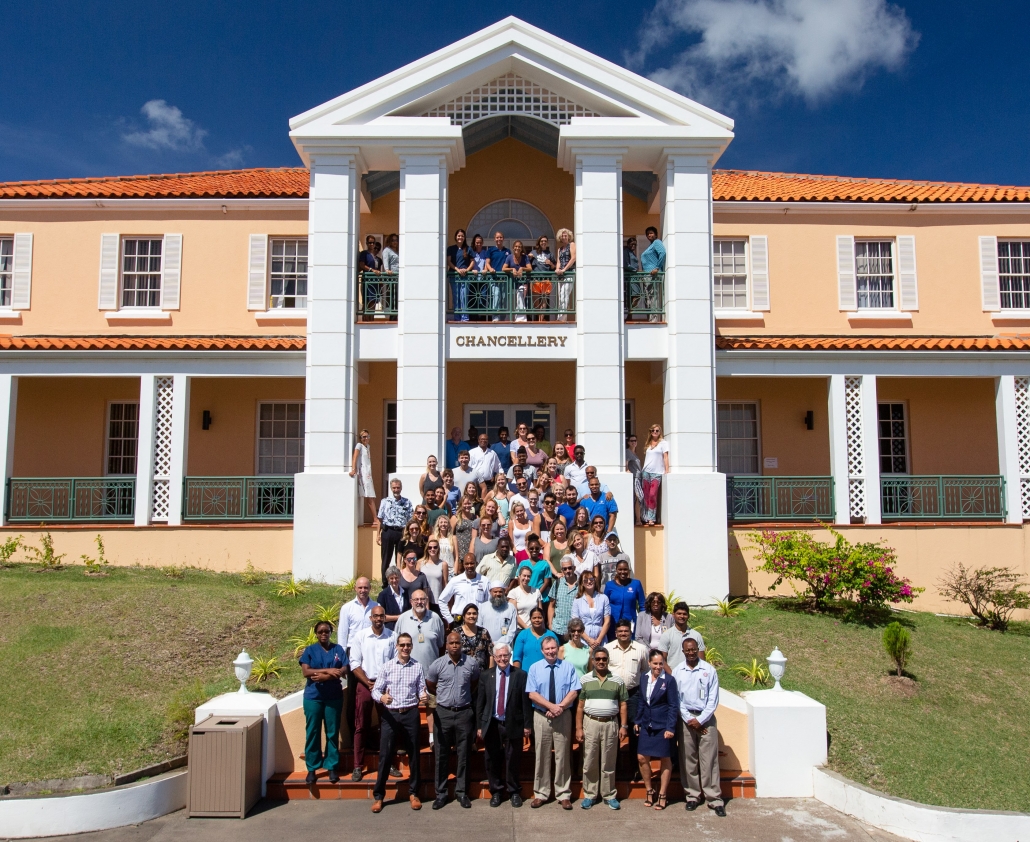
Career Day Helps Students Choose Path Toward Successful Future
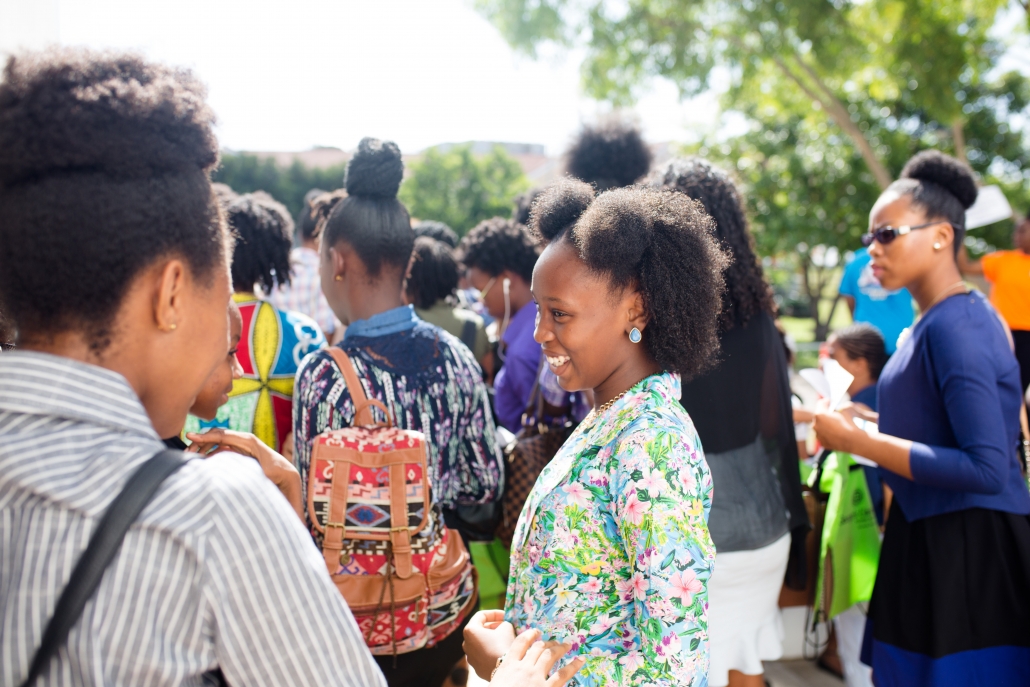
For more than a decade, St. George’s University and Rotaract Club of Grenada Career Day has been important not only for the future of Grenadian citizens but for the island as a whole.
This month, the True Blue campus welcomed hundreds of secondary school students and young adults from across the nation to explore a diverse range of career opportunities and the educational tools to help them reach their goals. It allowed attendees to mix with Grenada’s industry leaders and other respected professionals in smaller group settings to evaluate how they can develop themselves, their families, and their country.
“St. George’s University provides an ideal setting to offer this kind of guidance to students in answering the oft-difficult question of what career to choose, given this constantly evolving and competitive global marketplace,” said Colin Dowe, associate dean of admissions at SGU. “It is critical that we encourage our young Grenadians to explore non-traditional and emerging disciplines, which can foster both personal and national development.”
The SGU/Rotaract Club Career Day experience featured dozens of presentations utilizing its Career Track System, as well as interactive sessions led by current St. George’s University students. Eight different career tracks, ranging from agri-business and fashion to communications and meteorology, were set up in each of the major halls on campus. In addition to presentations for the students, the event featured the popular and informative Parents Session led by Mr. Dowe. The special session covered a range of topics—from financing your education to responding to the challenges faced by today’s students.
“I’m elated that SGU offered a special Parents Session at Career Day,” said Camme Roberts McIntosh, a Cherry Hill resident and mother of three. “I found the discussion on letting go and allowing your child to make their own decisions most helpful. It’s easier said than done when dealing with my eldest son, but I’m learning how to step back, release the reins a little bit, and trust him.”
“This is our second time coming to the Parents Session,” stated Petal Duncan from Laborie, St. Paul’s. “My husband and I were here last year when our daughter attended Career Day. We thought it was informative then and found it even more valuable this time around. There’s something very comforting about knowing you’re doing all you can to help prepare your child for university life and their future career. We thought it was important to be here and our daughter felt so too—in fact, every parent should be here.”
By holding Career Day, SGU’s goal is to assist students and parents in making informed career choices and motivating them along their journey towards educational and career fulfillment. As the largest private employer in Grenada, the University makes a point to fulfill its mandate as a good corporate citizen, embracing the opportunity to equip students with the tools to build a successful career path.
– Ray-Donna Peters
Fall 2019 Visitors Join Extended SGU Family at 18th Beyond Spice Family Weekend
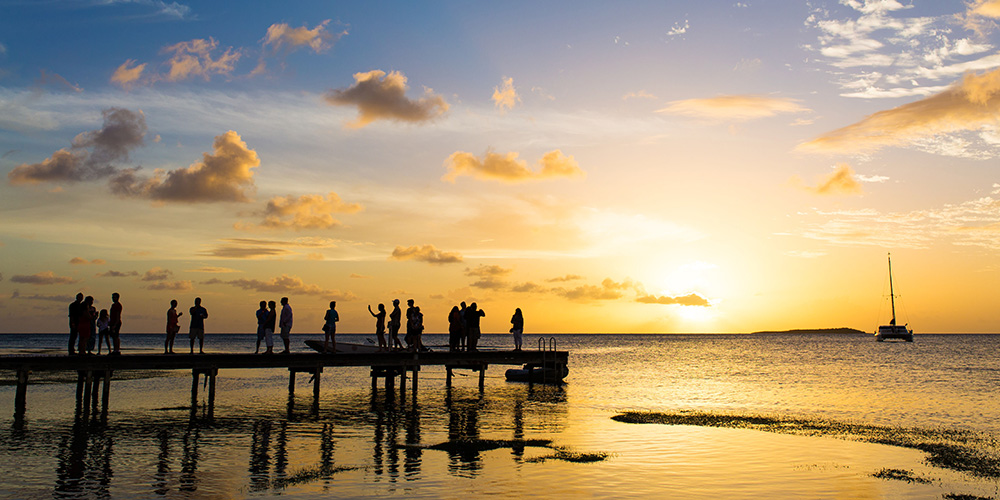
For James and Joyce Johnston, supporting their son Alexander’s dreams wherever they’ve led him was always a priority. First it was in his pursuits as a competitive ice hockey player. Now Alexander is a first-term student at St. George’s University School of Medicine, which prompted the Johnstons to join their son in Grenada at SGU’s 18th Beyond Spice Family Weekend.
“After getting injured while playing hockey, our son became inspired by his orthopedic surgeons to become a doctor,” shared Mr. Johnston. “We found out about SGU while researching medical schools together online and I encouraged him to apply. We couldn’t be prouder of his accomplishment.”
The Johnstons were one of dozens of families who soaked in Grenadian culture over the weekend, taking part in events such as a heritage tour, sea excursion, shopping opportunities, and a sunset barbecue. In addition, the weekend coincided with White Coat Ceremonies for medical and veterinary students, an event that marks their official entry into their respective professions.
“It’s a little hard on us with him moving so far away, so we decided to make it a vacation and join him for Family Weekend,” said Ms. Johnston. “I think every student should have a family member here for the Family Weekend. It connects parents with their students by letting them see firsthand what they’re getting involved in and it helps the parents get a better peace of mind.”
Michael Jacoby’s parents, on the other hand, had no qualms about their son moving three thousand miles away to attend medical school at St. George’s. Through their own research, Annie Allen and Doug Engman knew that students’ safety was paramount to SGU. The couple worried more about how Michael was going to get any studying done surrounded by such a spectacular view.
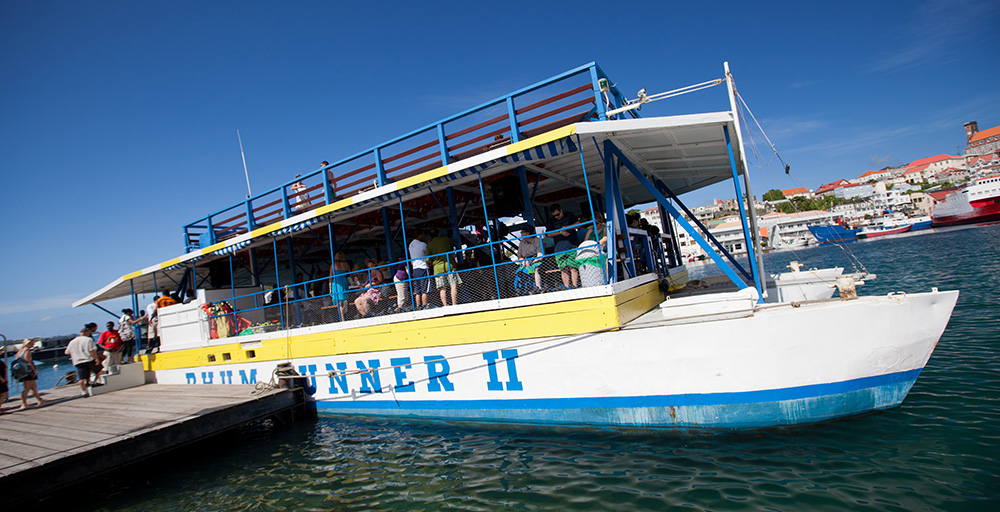
“I wasn’t the least bit worried about my son coming to SGU because I knew he would be safe there,” said Ms. Allen. “The island is wonderful and I’m already planning my next trip back.”
“The campus is distractingly beautiful, but in life, you’re going to have distractions,” stated Mr. Engman. “You have to be laser-focused on your goals. I don’t think SGU could have provided a more peaceful setting for students to get their studies done.”
Now celebrating its 11th year, Family Weekend continues to invite family members to visit the country and campus that their students have now made their home away from home.
“Each semester we happily look forward to opening our doors to host students’ families who’ve traveled from across the globe to experience a weekend of sun, sea, and family in the Spice Isle,” said Robert Ryan, dean of admission. “Family Weekend was also designed to allow our visitors to have meaningful interactions with our top administrators. The sense of pride and accomplishment with which the parents speak of their students not only brings joy to us but serves as a reminder of St. George’s deeply held commitment to assisting students in realizing their various academic and professional aspirations.”
According to Mr. Ryan, those who attended the sunset barbecue even had the opportunity to witness a green flash, a natural solar phenomenon that rarely occurs just as the sun dips below the horizon.
– Ray-Donna Peters
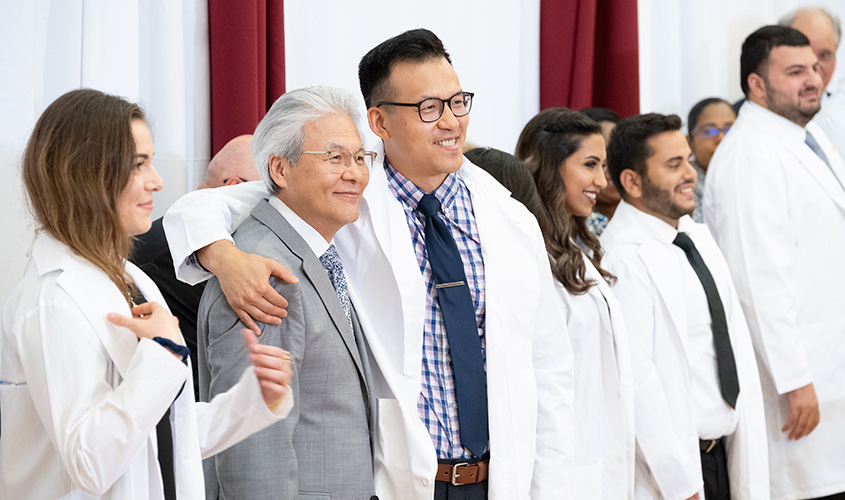
Eugene Becomes First Caribbean National to Lead SAS
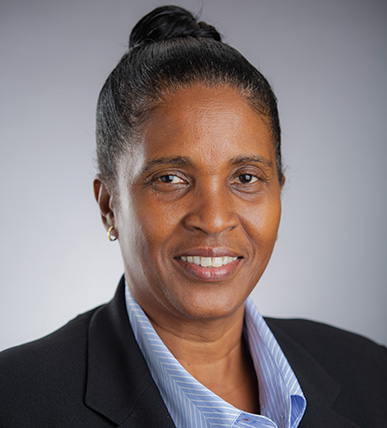
Dr. Lucy Eugene
As the new Dean of St. George’s University’s School of Arts and Sciences (SAS), Dr. Lucy Eugene is deeply committed to its growth. Her appointment as dean is the latest advancement in her near decade of professional service to SGU.
Dr. Eugene assumed her new role on August 16 after serving in the position in an interim capacity since February 2019. A native of Trinidad and Tobago, she is the first Caribbean national to become the school’s dean. Given that many of the school’s nearly 800 students as well as faculty are from Grenada and the rest of the English-speaking Caribbean, she plans to use knowledge of Caribbean culture to her advantage.
“I want students and faculty to continue to be proud that they belong to a school that recognizes their Caribbean upbringing while enhancing opportunities for them to make meaningful contributions not only in Grenada but regionally and internationally,” said Dr. Eugene. “That’s what this position means to me—being able to make a difference in their lives.”
Dr. Eugene has been a part of the SGU faculty since July 2010. Dr. Eugene served eight years in the Department of Business and Management Studies as a professor and chair, where she lectured on international business law and trade regulations. In May 2018, she took on the role of associate provost for faculty and administrative affairs for SGU before becoming interim dean for SAS.
“We are very pleased to appoint Dr. Eugene as dean of SAS,” said Dr. Glen Jacobs, SGU Provost. “Lucy’s longtime commitment to SGU, her deep involvement in the school through various committees and initiatives, and forward thinking about the future of the SAS and the student experience will ensure continued success in her new role.”
Dr. Eugene has placed enrollment growth, quality assurance (including accreditation), and faculty development at the top of her priority list. She has already launched plans to standardize quality assurance processes and obtain accreditation for SAS programs through the Grenada National Accreditation Board (GNAB) and other professional international accreditation bodies. For faculty, Dr. Eugene wants to create opportunities for them to further their own professional aspirations including working closely with SGU’s Department of Educational Services.
“As a longtime faculty member and administrative member of SAS, I am very familiar with the issues and concerns of the students, faculty, and staff, and I am approaching this position with a sensitivity and appreciation of those issues,” Dr. Eugene said.
For example, she noted that, as dean, she has been able to pursue classroom upgrades in a meaningful way so that classes are “consistent with the high quality evident throughout the rest of the university, giving students and faculty a sense of integration with the rest of the SGU community.”
Dr. Eugene received her PhD in Law from the School of Law at the University of Manchester, United Kingdom. Before joining SGU, she lectured at the University of the West Indies (UWI), Mona campus. In addition to her academic appointments, Dr. Eugene served as the regional coordinator for the World Trade Organization’s (WTO) UWI training programs throughout the Caribbean. Her research interests include international business opportunities for small- and medium-size enterprises—particularly those in developing countries—as well as investment, educational services, and labor law issues related to international trade.
“To have been recognized and appreciated is very fulfilling for me in this stage of my career,” Dr. Eugene said. “I am honored to have been given this opportunity and I look forward to using my experience and perspective to grow SAS to its full potential.”
– Laurie Chartorynsky
Global Medical Students Welcomed Onto Path of “Lifelong Learning” at White Coat Ceremony
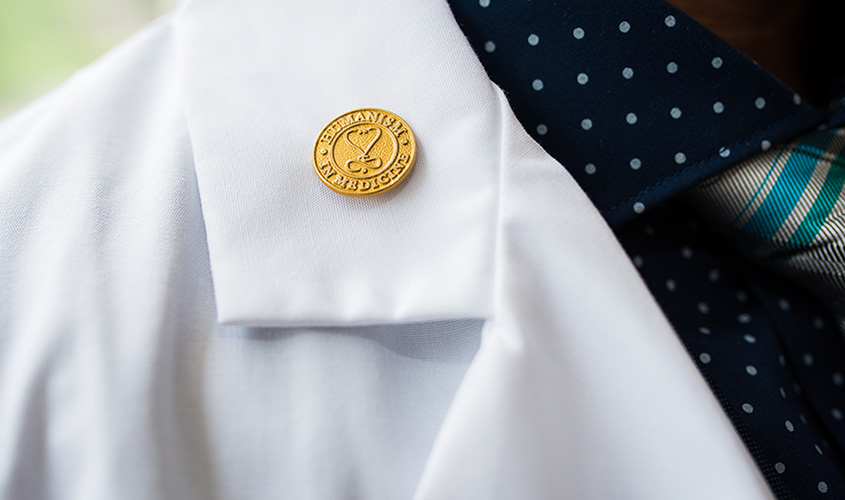
Students from around the world took their first steps into their medical education at the traditional White Coat Ceremony, inaugurating the 12th year of a partnership between St. George’s University and Northumbria University in Newcastle, England.
Seventy-five students from countries including Canada, the United States, United Kingdom, Hong Kong, Thailand, and Botswana were formally inducted into the St. George’s University School of Medicine/Northumbria University Joint MD Program. Since its establishment in 2007, the SGU/NU program has welcomed more than 1,700 students to the medical education track.
Path of Lifelong Learning
Emceeing the ceremonies was Leah Ratner, MD ’14, an alumna of the joint program who is now a pediatric global health fellow at Boston Children’s Hospital in Massachusetts. Recounting stories from her time practicing in the US and attending conferences in Mexico, Dr. Ratner advised new students to adopt a multidimensional approach to medicine that goes “beyond the exam room” and encompasses the social determinants of health. She urged them to “empathize with others” and the personal and structural problems that their patients may face, and to take personal responsibility for working toward equity and justice in healthcare and medical institutions.
Dr. Matthew Wynia, director of the Center for Bioethics and Humanities at the University of Colorado, and a former visiting professor at SGU, delivered the keynote address. He encouraged the students embarking on a “path of lifelong learning” to think of medicine as a series of complex adaptive systems, where knowledge of individual parts is not the same as an understanding of the whole, and outcomes will depend upon doctors’ abilities to constantly address these evolving challenges.
“We are creating our professional culture all the time, in every ordinary decision we make,” he told students, echoing Dr. Ratner’s advice to address the “hard questions” about doctors’ social responsibilities.
Special Tribute
To open the day’s proceedings, Professor Jon Reast, pro-vice chancellor at Northumbria University, paid special tribute to Baroness Howells of St. Davids, a former trustee of the St. George’s University UK Trust and a firm fixture of White Coat Ceremonies in years past.
Baroness Howells, who stepped down from the House of Lords earlier this year, is the only Grenadian to join the peerage and is a former president of the Windward Islands Research and Education Foundation (WINDREF), a Grenada-based research institute that collaborates with SGU.
The SGU/Northumbria joint program, formerly the Keith B. Taylor Global Scholars Program, was founded in 2007 to create a pathway for highly qualified international students to pursue a world-class medical education by beginning their physician training with SGU at Northumbria, before going to Grenada to continue their studies. Earlier this year, the universities announced that the joint program would be expanded to allow students to complete up to two years of their pre-clinical medical education in the UK.
Op-Ed: Why California needs more internationally educated doctors
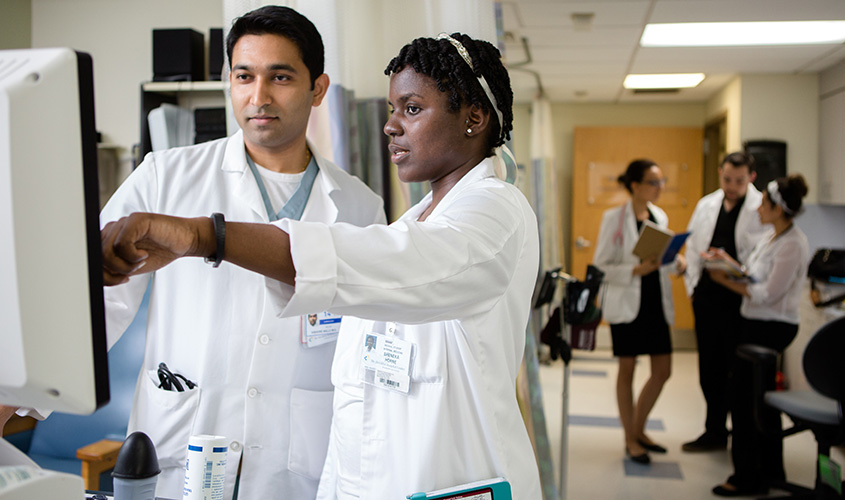
This article was originally published in the San Francisco Chronicle on August 31, 2019. St. George’s University has obtained the rights to republish the article.
California’s doctor shortage is acute. More than 7.7 million Californians live in federally designated “primary care health professional shortage areas.” Only about 40% of the state’s primary care needs are currently being met.
This situation is poised to get worse. California isn’t producing or recruiting enough new doctors to replace those who are retiring. Meanwhile, the state’s population is rapidly aging. To keep up with demand, the state will need an additional 4,100 primary care doctors by 2030.
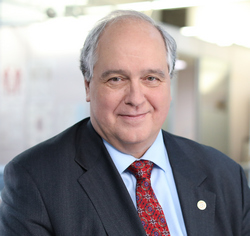
Dr. G. Richard Olds is president of St. George’s University
Already, many low-income Californians find it impossible to get the health care they need. Many patients enrolled in Medi-Cal struggle to find doctors who will take their insurance.
To their credit, state leaders recognize that there’s a problem. The state recently began forgiving medical school debt for doctors who commit to treating a certain number of Medi-Cal patients. That’s a commendable step. But wiping away doctors’ debt won’t do much to alleviate the inability of many state residents to access care.
To really address this problem, California needs to increase the supply of doctors. It can start by recruiting more graduates of international medical schools.
Many “international” graduates actually hail from California and would jump at the chance to serve their home communities. (A growing number of Americans choose to study at medical schools abroad, partially because of the high cost of U.S. institutions.)
In February 2019, the California Future Health Workforce Commission released its plan for boosting the supply of doctors in the state. In addition to loan forgiveness, the commission floated other ideas, like increasing the role of nurse practitioners and offering scholarships for students who commit to working in underserved areas.
Noticeably absent from the plan was any mention of recruiting more international medical graduates to California. International graduates are perfectly suited to meet the health care needs of historically medically underserved Californians.
According to a report from the American Immigration Council, more than half of international graduates work in places where per capita income is $30,000 or less. Compared to U.S.-educated physicians, doctors trained abroad are more likely to treat Medicaid patients.
International medical graduates also disproportionately practice in areas with large minority populations. About 25% of all doctors nationwide graduated from international medical schools. But in places where more than half of the population identifies as Hispanic, more than 36% of doctors are international medical graduates.
That’s important in California. More than half of Medi-Cal enrollees are Hispanic, according to 2013 Kaiser Family Foundation data.
Some people erroneously believe that international medical graduates are less qualified to practice medicine than those who graduate from U.S. medical schools, but their graduates are held to the exact same standards as U.S.-trained doctors. All medical school graduates who wish to practice in the United States must pass all four parts of the United States Medical Licensing Examination. Aspiring physicians are tested on topics ranging from the cardiovascular system to population health.
Medical students must also train in clinical settings prior to graduation. Some international students train in the United States. Unlike students from U.S. medical schools, international students are required to work in teaching hospitals with residency programs. Working in close proximity with practicing residents provides international graduates with experiences that help them thrive in their own postgraduate work.
California desperately needs primary care doctors, but only 41.5% of seniors graduating from U.S. medical schools in 2019 chose primary care as their specialty. Meanwhile, roughly 70% of international graduates chose pediatrics, internal medicine, or family medicine in this residency match cycle.
Recruiting more doctors from international schools won’t just address the primary care shortage — it’ll improve the quality of care in the state. One study published by BMJ, a medical journal, found that patients treated by international graduates had lower 30-day mortality rates than those treated by U.S.-educated doctors.
Low-income Californians deserve access to high-quality care. The state needs more doctors to supply that care. International medical graduates can be those doctors.
— G. Richard Olds
St. George’s University Grants Four Honorary Degrees, Service Awards During 2019 Commencement
St. George’s University honored a new class of medical school graduates from 38 countries and bestowed honorary doctorates and service awards on four individuals during its commencement ceremonies this past weekend.
“It is my pleasure to be here once again at one of these ceremonies to recognize your accomplishments,” said Dr. Charles Modica, Chancellor and Chair of the Board of Directors at St. George’s University, in his opening remarks.
Doctorates of Humane Letters were awarded to Dr. Mark Lanzieri, a Massachusetts cardiologist and 1985 St. George’s alumnus, and José Sánchez, President and CEO of Norwegian American Hospital in Chicago.
For 20 years, Dr. Lanzieri has returned to Grenada to provide cardiological care free of charge to Grenadians. He encouraged the Class of 2019 to stay connected to the St. George’s community. “We need your involvement more than ever,” he said. “I would encourage you that this is not your last interaction with SGU or Grenada, and that you become involved early with the alumni association.”
Dr. Sánchez has managed healthcare and hospital systems for more than three decades. He is a member of the Illinois State Board of Health and helps lead several other state boards, councils, and commissions.
Marty Lyons, a philanthropist and former defensive lineman for the New York Jets, and Congressman Max Rose received Distinguished Service Awards.
In 1982, Lyons founded the Marty Lyons Foundation, which has 11 chapters across the United States. The non-profit grants wishes for terminally ill children.
“Life is about making opportunities and choices,” Mr. Lyons said. “You’ve made one that started four years ago, when you started to chase a dream of helping other people, and making a difference in this world.”
Congressman Rose is a decorated war veteran who represents New York’s 11th congressional district, which includes Staten Island and South Brooklyn. Prior to his election to Congress, he was Chief of Staff for Brightpoint Health, a non-profit dedicated to meeting the healthcare needs of New York City’s underserved populations.
